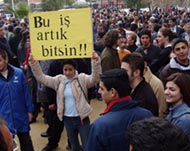Cypriots welcome UN reunion plan
Greek and Turkish officials and media have largely welcomed a decision to resume UN-sponsored talks to help reunify Cyprus, with the EU poised to play a major role.

The Greek Cypriot president, Tassos Papadopoulos, and the Turkish Cypriot leader, Rauf Denktash, agreed at a meeting in New York to resume negotiations on the basis of a UN plan, with a settlement approved through referendums in April.
“The role of the EU is upgraded significantly,” said Papadopoulos on Saturday on his return from the meeting. “I have assurances … that the role of the EU will be multifaceted and constant at all levels and stages of the negotiations.”
Cyprus becomes a full member of the EU on 1 May, and Papadopoulos and the Greek government have stressed that any settlement must comply fully with EU basic law.
This would ensure freedom of movement and the right to property, leading to the return of all the Greek Cypriot refugees to the Turkish-occupied north of the island, something rejected by the Turkish side and restricted in UN Secretary General Kofi Annan’s plan.
But Papadopoulos’ view on EU involvement contrasted with that of Annan, who excluded the EU from a direct role in the talks. Annan said the EU would be involved on the sidelines to offer advice on technical issues, as in previous rounds.
Greeks cautious
Both sides see acceptance of the Annan plan as a painful compromise, as reflected in Saturday’s Greek Cypriot newspaper headlines on the agreement reached in New York.
“A hollow victory,” said the English language Cyprus Mail. “Annan imposed his terms – Turkey won its demand for a four-party conference,” said the rightwing Simerini.
 |
|
The Greek Cypriot leader is wary |
But in Greece, the Athens daily To Vima headlined: “The Cyprus problem has been solved practically.”
Greek Foreign Minister George Papandreou offered caution, saying the two sides were entering “the last and most difficult phase in the solution of the Cyprus problem”.
And the Greek Cypriots remained sceptical of Turkey’s ultimate game plan.
“We managed to turn the accession of Cyprus (to the EU) into a positive negotiation tool. Now, it remains to be seen if the other side wants to have a reunified Cyprus entering the EU or not,” Papandreou said late on Friday.
Success “will primarily depend on whether the Turkish side has changed its policy on the Cyprus issue, if it strives for a settlement … or if it maintains its old position for division”, said Papadopoulos.
Turkish delight
But Turkey’s leading newspapers celebrated the news. “Europe present,” headlined daily Sabah. “History is being written,” was the headline of Milliyet. “The end of the tunnel is seen,” declared the daily Radikal.
“A nice step has been taken. Our wish is that a just and lasting solution is reached,” said Erdogan.
 |
|
Turkish Cypriots urge an end to |
Turkish Cypriots generally welcomed the deal for the resumption of peace talks but cautioned that a final settlement to their decades-old division could not be taken for granted.
As soon as news broke of the breakthrough, dozens of jubilant Turkish Cypriots formed convoys of cars and toured the streets of the northern sector of bisected Nicosia, honking horns and chanting “Peace cannot be prevented in Cyprus.”
For the Turkish Cypriots, reunification with the internationally-recognised Greek Cypriot south would mean an end to decades of isolation from the world community and the lucrative prospect of joining the EU.
If settlement efforts fail, only the Greek Cypriots will join.
Bridging differences
Cyprus has been divided into a Greek Cypriot-controlled south and the Turkish-occupied north since Turkey invaded in the wake of an abortive coup by supporters of union with Greece.
The breakaway Turkish Cypriot state in the north is only recognised by Turkey, which maintain 40,000 troops there. EU laws and benefits will only apply to the south when Cyprus is admitted to the EU.
Under the deal, which was brokered by Annan, the UN blueprint for reunification will be put to the Cypriot people in referendums in April. It calls for a single state with Greek and Turkish Cypriot federal regions linked through a central government.
Negotiations between Greek and Turkish Cypriot leaders were to resume on 19 February in Cyprus, according to the deal. Officials hope for a successful conclusion by 22 March.
If continuing negotiations yield no agreement, Annan would fill in the gaps and submit the final plan for approval by the two Cypriot communities in separate referendums in April.